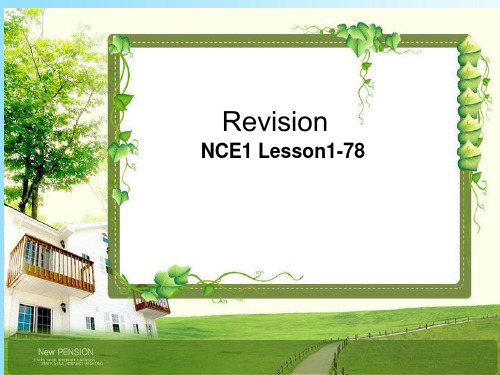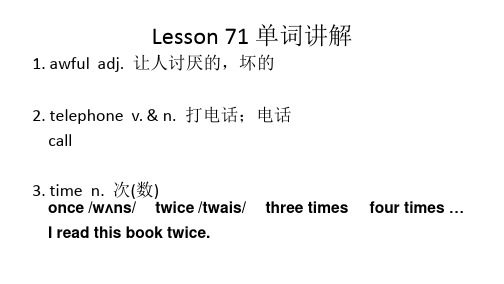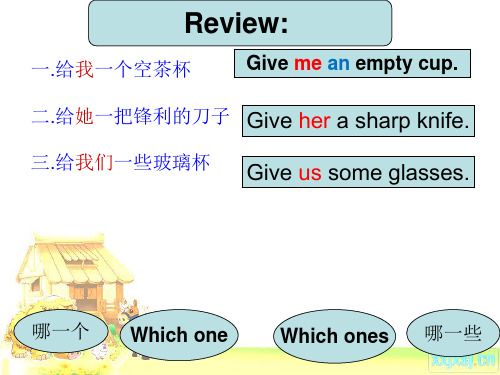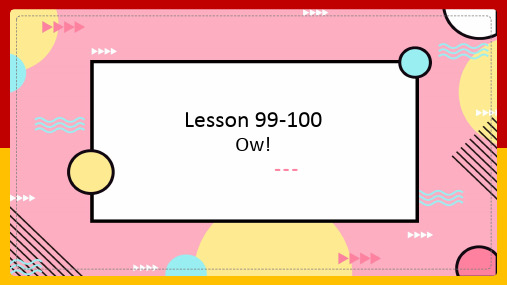新概念英语1lesson1课件
新概念英语第一册课件 NCE1 Lesson 63-64

Lesson 63 单词讲解1.better adj. 形容词good和well的比较级There is no best but better.I am better.2.certainly adv. 当然I can certainly help you.I certainly love you. 情be后实词前,句首句尾表强调He is certainly happy.Certainly I love you.“Can I use your bike?”“Certainly.”“Certainly not.”3.get up 起床go to bed / go to sleep4.yet adv. 还,仍5.rich adj. 油腻的6.food n. 食物rich food fast food seafood green food 7.remain v. 保持,继续Lesson 63 课文讲解How are you?How is he?How is she?How is the weather?He is better.can 1 能力 2 允许(征求对方的意见) 3 请求,要求upstairs adv. 楼上downstairs adv. 楼下go upstairs 上楼go downstairs adv. 下楼come upstairs come downstairsfor + 时间表示一段时间for three yearsfor twenty yearsfor everanother + 可数名词单数Here is another photograph. another + 数词+ 名词(可以是复数) I need another two hammers.What about the dog?about prep. 关于I am sorry about that.大约There are about ten boys in the room. each day VS every dayevery 强调整体every day 每天Their father takes them to school every day.each 强调个体each day 每一天(中)You must take the medicine three times each day. Jimmy gives Mr. Williams his cold.Lesson 63 语法讲解have (has)1.拥有have an umbrella have a bike have some water 2.吃,喝have an apple have a biscuit have some coffee 3.患生得长有如遇到h 视a 频v 无e 法正f 常lu 播放,课件错误,知h 识a 点v 错e 误等m 课程e 问a 题s ,le 可以s 添加服务QQ31h 70a 32v 2e 794m 进行u 解m 决,p 学s 习问题请到知识堂: http:/have (has) 4.have +aLesson 63 语法讲解名词(动作、行为)从事、进行……have a bath / a rest / a talk / a swim / a walk / a try 5.经历have a holiday have a party have a class1.play v. 玩Lesson 64 单词句型讲解They are playing in the garden.play with ……play with a ball / doll / toy2.match n. 火柴3.talk v. 谈话talk bigmatchesHe always talks big.4.library n. 图书馆5.drive v. 开车drive somebody to somewhereI can drive you to the airport.6.so adv. 如此地so happy so easy so nice 7.quickly adv. 快地Quickly! Hurry up!8.lean out of 身体探出lean /li:n/ v. 倾斜,倚靠Don’t lean out of the window! 9.break v. 打破break a glass / a vase / a window break the fast = breakfast10.noise n. 喧闹声make a noise动词原型walk walks walking情态动词+ 动词原型He must stays at home.She can help us.He must stay at home.be going to + 动词原型I am going to do my homework.祈使句中的动词用原型Don’t + 动词原型Be careful! Don’t drop it!She often get up early.如遇到S视h频e无法o正f常t播e放n,g课件e错ts误,u知p识点e错a误r等l课y程p:/Lesson 63&64 知识拓展(学生版)1.—What does Linda often do in the evening?—She often her homework.A doB didC doneD does2.Bob is ill. He must a doctor.A seesB seeingC seeD saw3.Let me .A have tryB have a tryC do tryD do a try4.—What would you like to drink?—I would like to have .A some teaB any teaC an teaD a tea。
新概念英语第一册Lesson17-18课件(共33张ppt)

集体名词:表示一群人或一些事 物的名词,以单数形式出现,但 实为复数。
如: people, police等本身就是复数, 不能说 a people,a police,但可以说 a person,
a policeman
the English,the British,the French,the Chinese,the Japanese等名词,表示国民总称时 ,作复数用。
?
Who is this young man ?
祈使句:用来表示建议,命令,叮嘱等。
Richards .
assistant n.
Fill in the blanks:
This is Jim . What are their jobs?
-ee 一般指动作的承受者,被动者 operators
What are their jobs?
2.Nice to meet you. 非正式场合: 回答:Nice to meet you too.
3.How are you?用于朋友或相识的人 之间见面的询问身体状况的问候语。 回答:I am fine./I am well.
4.What are their jobs? 他们的工作是什么?
What’s your/his/her job? 你的/他的/她的工作是什么?
Come and meet our employees.
祈使句:用来表示建议,命令,叮嘱等。没 有主语。
This is Nicola Grey.
介绍别人时: This is ...
自我介绍时: My name is ... I’m …
1.How do you do? 用于正式的场合,第一次见面 回答:How do you do?
新概念英语第一册复习课件

形容词 名词前,be动词后
• dirty-clean sharp-blunt good-bad • lazy—hard-working busy-free • same-different • comfortable-uncomfortable • smart lovely tired thirsty terrible fresh
tobacco stereo refrigerator electric cooker hammer kettle teapot envelope pad change photograph passport fashion appointment noise • 学校:chalk handwriting subject conversation phrasebook • 房子:building cloakroom • 方位:middle north south east west • 疾病: temperature flu measles mumps aspirin
新概念英语第一册复习课件
• 星期:week Sunday Monday Tuesday Wednesday Thursday Friday Saturday weekend
• 季节:season spring summer autumn winter • 地点:village church dairy town • 生活:case carpet fork spoon cupboard cigarette
• 五号 • 一个新学生 • 电脑操作员 • 工程师 • 空姐 • 我女儿的 • 上楼 • 相同的颜色 • 一顶可爱的帽子 • 推销员
新概念英语第一册复习课件
• office assistant • customs officer • taxi driver • an ice cream man • the dressing table • the stereo • on the right • on the left • in the middle of • put on
新概念英语第一册课件 NCE1 Lesson 71-72

Lesson 71 单词讲解1.awful adj. 让人讨厌的,坏的2.telephone v. & n. 打电话;电话call3.time n. 次(数)once /wʌns/ twice /twais/ three times four times …I read this book twice.4.a nswer v. 接(电话)answer the phonest adj. 最后的,前一次的last night / last week / last month / last year6.phone n. 电话7.again adv. 又一次地Very nice to see you again.8.say (said) v. 说say /sei/ said /sed/ says /sez/say VS speaksay 强调说话的内容She said hello to me.He said sorry to me.My mom always says “Life was like a box of chocolate…”speak 突出说话的方式或动作本身speak loudly speak slowly speak EnglishLesson 71 课文讲解What is the climate like?What is the weather like?He telephoned me again.yesterday evening last nightLesson 71 语法讲解He was in the office.Was he in the office?Yes, he was. No, he wasn’t.He wasn’t in the office.Where was he?Who was in the office?There was a car race in our town in 1998. Was there a car race in our town in 1998? There wasn’t a car race in our town in 1998. What was there in our town in 1998?He went to school yesterday. do did /did/ Did wentDo he go he Do to school yesterday? ? e He like s coffee .He went to school yesterday. do notdid He donotgowent to school yesterday.He didn’t go to school yesterday.He went to school y e s t e r d a y. 他什么时候去上学了?did When do hegowent to school?He went to s c h o o l yesterday. 他昨天去哪了?did goWhere do he went yesterday?He w e n t to school yesterday. 他昨天干什么了?did doWhat do he did yesterday?He went to school yesterday. 昨天谁去上学了?Who went to school y esterday?She lived in New York.Did she live in New York? Yes, she did. No, she didn’t. She didn’t live in New York. Where did she live?Who lived in New York?I bought a book in that bookstore last week. bought /b ɔ : t/ buy 的过去式Did you buy a book in that bookstore last week? Yes, I did. No, I didn’t.I didn’t buy a book in that bookstore last week.When did you buy a book in that bookstore?Where did you buy a book last week?Lesson 72 单词句型讲解Today:this morningthis afternoonthis eveningLesson 72 单词句型讲解t onightLesson 72 单词句型讲解Yesterday:yesterday morningyesterday afternoonyesterday eveningLesson 72 单词句型讲解l ast nightThe day before yesterday:the day before yesterday in the morningthe day before yesterday in the afternoonthe day before yesterday in the evening如遇到视频无法正常播放,课件错误,知识点错t 误h 等e 课n 程问ig 题h ,t 可b 以e 添f 加o 服r 务e Ql Qa 3s 17t 0322794进行解决,学习问题请到知识堂: http:/Tomorrow:tomorrow morningtomorrow afternoontomorrow eveningtomorrow nightThe day after tomorrow:the day after tomorrow in the morningthe day after tomorrow in the afternoonthe day after tomorrow in the eveningthe night after next1.She is going to come now. (when)2.She can come now. (when)3.She wants a new bike. (what)4.There is a book on the table. (what)5.They like black coffee. (what)6.Mary comes from Germany. (where)7.He must go home now. (when)8.She feels ill. (how)9.He has a cold. (what)10.She cleaned her shoes. (when) A 一般疑问句B 特殊疑问句C 否定句1.She is going to come now. (when)Is she going to come now?When is she going to come?She isn’t going to come now.2.She can come now. (when)Can she come now?When can she come?She can’t come now.3.She wants a new bike. (what)Does she want a new bike?What does she want?She doesn’t want a new bike.• 4. There is a book on the table. (what)•Is there a book on the table?•What is there on the table?•There isn’t a book on the table.5.They like black coffee. (what) •Do they like black coffee?•What do they like?•They don’t like black coffee.6.Mary comes from Germany. (where) •Does Mary come from Germany?•Where does Mary come from?•Mary doesn’t come from Germany.7.He must go home now. (when) •Must he go home now?•When must he go home?•He needn’t / mustn’t go home now.8.She feels ill. (how) •Does she feel ill?•How does she feel?•She doesn’t feel ill.9.He has a cold. (what)•Does he have a cold?•What does he have?•What is the matter with him?•He doesn’t have a cold.10.She cleaned her shoes. (when) •Did she clean her shoes?•When did she clean her shoes?•She didn’t clean her shoes.。
新概念英语第一册lesson

the room.
There is a bottle _o__n__ the table.
The bottle is _e_m___p_t_y___. There is a cup on the table t_o__o___.
_T_h__e_ cup is __c_l_e_a__n_.
Can you introduce the kitchen
二. 在这个房间里有一把椅子和三张桌 子
There is a chair and three tables in the room.
There be句型遵循就近原则.
There is a red book on my desk.
否定形式: There is a chair in the room. There is not a red book on my desk. There isn’t a chair in the room.
记忆力大比拼
Mrs. Smith’s __k_i_t_c_h__e_n_ is small. There___is____ a refrigerator __in___t_h_e___k_i_tc__h_e__n_____.
_T__h_e__ refrigerator is white.
It is o__n__ the right.
There is……
on the table clean There is a cup on the table. The cup is clean.
There is……
on the floor large There is a box on the floor. The box is large.
新概念英语第一册Lesson+99-100课件

Lily
Lily says that she has got a cold.
What’s the matter with you? I have got a fever.
Mary Mary says that she has got a fever.
What’s the matter with you?
Take an aspirin.
OK.
Lucy
Lucy has got a headache.
Doctor asks Lucy to take an aspirin.
Take some medicine.
OK.
Lily has got a cold. Lily
Doctor asks Lily to take some medicine.
PRACTICE
The boy says “I have got earache.”.
The boy says __h_e__h_a_s__g_o_t_e_a__ra_c_h_e__________.
The children say “ We have got toothache.”.
The children say __th__e_y_h_a__v_e_g_o_t__to_o_t_h_a_c_h_e______.
间接引语 宾语从句
I ask what Lucy has got.
I ask, “What has Lily got?”
I ask what Lily has got.
I ask, “What has Mary got?” I ask what Mary has got.
I ask, “What has Robert got?” I ask what Robert has got.
新概念英语青少版入门级Aunit1课件 ppt课件
苹果
鸡蛋
新概念英语青少版入门级Aunit1课件
Yes.
Yes.
No.
新概念英语青少版入门级Aunit1课件
No.
新概念英语青少版入门级Aunit1课件
一个苹果
一个球
一只猫
一条狗
一个蛋 新概念英语青少版入门级Aunit1课件
一条鱼
小练习
新概念英语青少版入门级Aunit1课件
×
××
×
新概念英语青少版入门级Aunit1课件
Yes! A fish! 没错!一条鱼! 5、No cat! No ball! 猫没了!球没了!
Flora
Robert
Dan Kim
cat
新概念英语青少版入门级Aunit1课件
fish ball
球
猫
狗
新概念英语青少版入门级Aunit1课件
鱼
•怎么用英文和对方打招呼?
新概念英语青少版入门级Aunit1课件
×
新概念英语青少版入门级Aunit1课件
UNIT 1
Hello!
Lesson 3
新概念英语青少版入门级Aunit1课件
新概念英语青少版入门级Aunit1课件
•下面我们来玩一个小游戏。 •Let's play a game. 连连看
新概念英语青少版入门级Aunit1课件
A C
c cat
B
e egg
新概念英语青少版入门级Aunit1课件
Thank you
新概念英语青少版入门级Aunit1课件
你好
你好
新概念英语青少版入门级Aunit1课件
一条鱼
一只猫 一条狗 一个球
新概念英语青少版入门级Aunit1课件
新概念英语第一册第1-2课课件
Is______________________________________ this your coat?
三、 写出回答 1. Is this your 2. Is this your 3. Is this your 4. Is this your
pencil? watch? shirt? skirt?
请同学们把下面句子变为疑问句: • This is your pen. =>Is this your pen? • This is your pencil. => Is this your pencil? • This is your book. => Is this your book? • This is your watch. => Is this your watch? • This is your coat. => Is this your coat? • This is your dress. => Is this your dress? • This is your skirt. =>Is this your skirt? • This is your shirt. => Is this your shirt? • This is your car. => Is this your car? • This is your house. => Is this your house?
新概念英语第一册Lesson1-2精讲PPT课件
(含be动词)一般疑问句
一般疑问句定义:答案是Yes或No的疑问句。 陈述句改一般疑问句:be动词提到句首(注意一 二人称变化)
一般疑问句的回答比较简单。一般来说,是 “用什么问,用什么答。”
e.g. I am a student. Are you a student? 是的,它是。Yes, I am. 不,它不是。No, I‘m not.
4.Lily is seven.(改为一般疑问句) Is Lily seven ?
5.Are your sister a student?(改错) Is your sister a student ?
Text
Excuse me . • 常用于与陌生人搭话,打断别人的说话或从别人身
边挤过。 • eg: Excuse me,can you tell me the way to the
含Be动词的否定句
否定句定义: 有否定意义的句子是否定句。 特点:be +not 构成否定
e.g: It is my pen. It is not ( isn't ) my pen.
否定的缩写形式 I am not = I'm not are not = aren’t is not = isn't
bookstores ? Yes?
读降调,表示肯定的意思,意为“是、是的”
读升调,表示不确定或询问之意,也有要 求对方继续说下去的意思。译为;“什么事”
Is this your handbag? 含Be动词的一般疑问句。
例题:I am a student. This is my book.
Pardon? 对不起,请再说一遍。 完整说法: I beg your pardon. Pardon me. = What did you say?
新概念英语1-18课复习课件
1.--What a nice bike! How long____you____it? --Just two weeks.(2004北京市中考)
A.will;buy B.did;buy C.are;having D.have;had 2.I won’t go to see the film because I____the ticket.(2002河南) A.lost B.have lost C.will lost D.didn’t
• 零冠词,不用冠词的情况。
零冠词口诀
• 代词限定名词前,专有名词不可数, 复数名词表泛指,学科球类三餐饭, 季节星期月份前,颜色语种和国名, 称呼习语及头衔。
零冠词(不用冠词) 1、在专有名词(国名,城市名,人名, 路名)前不用冠词。
Beijing is a beautiful city.
2、表泛指的不可数名词或名词复数前不用冠词。
Lesson 7 难点
He took off his coat. 还可以说: He took his coat off. He took it off. 不可以说: He took off it. 总结:在动词+副词构成的词组中,其后的宾语是名词 时,位置可放在中间或后面;是代词时,只能放中间。 类似词组:put on/out/away; pull down;give back;
be closed
member of get to
know
know
get married be married borrow keep
come here be here
buy
have
练习
• The film began 5 minutes ago. • The film_h_a_s b_e_e_n_o_n_ for 5 minutes. • The man died a week ago. • The man_h_a_s_b_e_e_n _d_e_a_d for a week. • He came here an hour ago. • They__h_a_s_b_e_e_n_h_e_re_for an hour.
